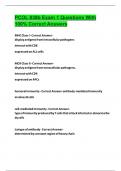Somatic recombination - Study guides, Class notes & Summaries
Looking for the best study guides, study notes and summaries about Somatic recombination? On this page you'll find 286 study documents about Somatic recombination.
Page 3 out of 286 results
Sort by
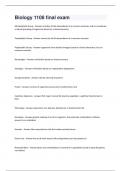
-
Biology 1108 final exam (Questions & Answers) Passed!!
- Exam (elaborations) • 9 pages • 2024
- Available in package deal
-
- $7.99
- + learn more
Monophyletic Group - Answer-includes all the descendants of a common ancestor, and its considered a natural grouping of organisms based on a shared ancestry. Paraphyletic Group - Answer-some (not all) of descendants of a common ancestor Polyphyletic Group - Answer-organisms from distinct lineages based on shared characters, but no common ancestor Homologies - Answer-similarities based on shared ancestry Analogies - Answer-similarities based on independent adaptations Synapomorphies - Answ...
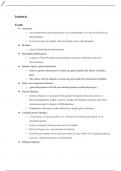
-
BIOLOGY 171 EXAM 2 LECTURE(6_12)
- Exam (elaborations) • 17 pages • 2024
-
Available in package deal
-
- $9.00
- + learn more
● Autosome: ○ Any chromosome not considered as a sex chromosome, or is not involved in sex determination. ○ It occurs in pairs in somatic cells and singly in sex cells (gametes) ● Bivalent: ○ a pair of homologous chromosomes. ● Drosophila melanogaster: ○ a species of fruit Fly much used in genetics because of the large size of its chromosomes. ● Epistasis (gene x gene interaction): ○ refers to genetic interactions in which one gene modifies the effects of another gen...
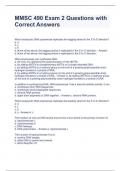
-
MMSC 490 Exam 2 Questions with Correct Answers
- Exam (elaborations) • 34 pages • 2024
-
Available in package deal
-
- $14.99
- + learn more
MMSC 490 Exam 2 Questions with Correct Answers Which eukaryotic DNA polymerase replicates the lagging strand in the 3ʹ to 5ʹ direction? a. α b. γ c. δ d. None of the above; the lagging strand is replicated in the 5ʹ to 3ʹ direction. - Answerd. None of the above; the lagging strand is replicated in the 5ʹ to 3ʹ direction. DNA polymerases can synthesize DNA: a. de novo, by catalyzing the polymerization of free dNTPs. b. by adding dNTPs to complementary dNTPs on a single-strand...
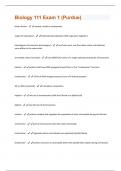
-
Biology 111 Exam 1 (Purdue) Quizzes And Answers Latest 2024
- Exam (elaborations) • 5 pages • 2024
- Available in package deal
-
- $7.99
- + learn more
binary fission - asexual, usually in prokaryotes origin (of replication) - bidirectional (replication AND separation together) homologous chromosome (homologue) - one from mom, one from dad; similar not identical; same alleles in the same order chromatid; sister chromatid - two IDENTICAL halves of a single replicated eukaryotic chromosome histone - proteins that have DNA wrapped around them in the *nucleosome* structure nucleosome - 147nt of DNA wrapped around a core of 8 histone proteins ...
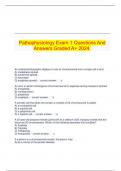
-
Pathophysiology Exam 1 Questions And Answers Graded A+ 2024.
- Exam (elaborations) • 28 pages • 2024
-
- $11.99
- + learn more
Pathophysiology Exam 1 Questions And Answers Graded A+ 2024. An ordered photographic display of a set of chromosomes from a single cell is a(n): A) metaphase spread. B) autosomal spread. C) karyotype. D) anaphase spread. - correct answer. c An error in which homologous chromosomes fail to separate during meiosis is termed: A) aneuploidy. B) nondisjunction. C) polyploidy. D) anaplasia. - correct answer. b A somatic cell that does not contain a multiple of 23...
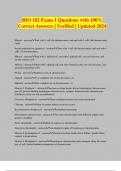
-
BIO 182 Exam 1 Questions with 100% Correct Answers | Verified | Updated 2024
- Exam (elaborations) • 5 pages • 2024
- Available in package deal
-
- $10.49
- + learn more
BIO 182 Exam 1 Questions with 100% Correct Answers | Verified | Updated 2024 Mitosis - answerStart with 1 cell (46 chromosomes) and end with 2 cells (46 chromosomes each) Sexual reproduction (gametes) - answerStart with 1 cell (46 chromosomes) and end with 4 cells (23 chromosomes) Mitosis - answerStart with 1 diploid cell, end with 2 diploid cells, one cell division, and mostly somatic cells Meiosis - answerStart with 1 diploid cell, end with 4 haploid cells, two cell divisions, and spe...
PCOL 838b Exam 1 Questions With 100% Correct Answers
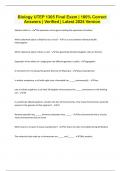
-
Biology UTEP 1305 Final Exam | 100% Correct Answers | Verified | Latest 2024 Version
- Exam (elaborations) • 20 pages • 2024
-
- $10.12
- + learn more
Biology UTEP 1305 Final Exam | 100% Correct Answers | Verified | Latest 2024 Version Epistasis refers to - The expression of one gene masking the expression of another. Which statement about a dihybrid cross is true? - It is a cross between identical double heterozygotes Which statement about mitosis is true? - Two genetically identical daughter cells are formed. Separation of the alleles of a single gene into different gametes is called - Segregation A mechanism for increasing th...
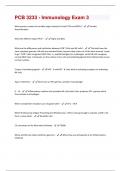
-
PCB 3233 - Immunology Exam 3 Questions and Answers 100% Verified
- Exam (elaborations) • 6 pages • 2024
- Available in package deal
-
- $7.99
- + learn more
What process creates the variable region domain for both TCRs and BCRs? - Somatic Recombination What the different types IFN-1? - Alpha and Beta What are the differences and similarities between CD8 T Cells and NK cells? - The both have the same cytotoxic granules, NK cells are activated faster, because they come out of the bone marrow "ready to go". CD8 T cells recognizes MHC Class 1 + peptide (antigen) on a pathogen, while NK cells recognize normal MHC Class 1 molecules on the surface ...
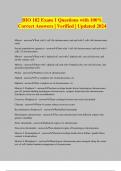
-
BIO 182 Exam 1 Questions with 100% Correct Answers | Verified | Updated 2024
- Exam (elaborations) • 5 pages • 2024
- Available in package deal
-
- $10.49
- + learn more
BIO 182 Exam 1 Questions with 100% Correct Answers | Verified | Updated 2024 Mitosis - answerStart with 1 cell (46 chromosomes) and end with 2 cells (46 chromosomes each) Sexual reproduction (gametes) - answerStart with 1 cell (46 chromosomes) and end with 4 cells (23 chromosomes) Mitosis - answerStart with 1 diploid cell, end with 2 diploid cells, one cell division, and mostly somatic cells Meiosis - answerStart with 1 diploid cell, end with 4 haploid cells, two cell divisions, and spe...

Study stress? For sellers on Stuvia, these are actually golden times. KA-CHING! Earn from your study resources too and start uploading now. Discover all about earning on Stuvia



